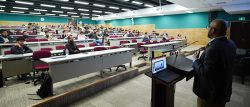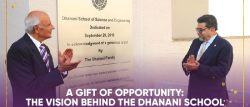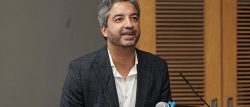-
Researchers writing for globally respected science magazine hold up transdisciplinary education as key to the 21st century for universities of the Muslim world
-
Article commends Habib University’s innovative science & engineering program; says other universities “should follow suit”
Karachi, November 4, 2015: An article published in the most recent issue of Nature – perhaps the most respected and cited magazine in the world of science – endorses the liberal arts model of higher education as a guiding light for universities in the Muslim world. The article, authored by Dr. Nidhal Guessoum and Dr. Athar Osama for the October 29, 2015 issue of Nature, is a summary of the key results, conclusions and recommendations of an international task force of experts.
This non-governmental and non-partisan task force of experts, formed by the Muslim World Science Initiative, investigated the state of higher education and scholarship in the Muslim world over the course of two years. It was chaired by science adviser to the prime minister of Malaysia, Zakri Abdul Hamid, and included a dozen experts and scholars, including policymakers, vice-chancellors, professors, and science communicators, from around the world.
“Our report highlights an even more problematic situation,” write Dr. Guessoum and Dr. Osama. “University science programmes are using narrow content and outdated teaching methods. In most OIC countries, students are channelled into science or non-science streams around the age of 14, and their education thereafter is completely binary: science and technology students receive little in the way of humanities, social-science, language or arts education, and vice versa.”
“To become beacons in society, OIC [Organization of Islamic Conference] universities need to revitalize their teaching methods and meld science with liberal arts such as history and philosophy.,” they recommend.
Later, they observe that: “Scientific research must be relevant and responsive to society’s intellectual and practical needs. This dual goal seems to be out of sight — and often out of consideration — for most academic institutions in the region.”
Recommending the kind of broad, holistic education espoused by Habib University as the right approach to improving higher education in Pakistan and other Muslim societies, they encourage other universities to follow suit.
“We also call for reform of science curricula and pedagogy. Universities need to deliver more multidisciplinary, exploratory science education,” they write.
The article also affirms Habib University’s commitment to creating rounded rather than narrow engineering and science professionals and modeling its learning programs in line with practices in the established and respected institutions of the world.
To read the full text of the Nature article, click here.
For more about our programs of learning, click here.
Daily Times, a Pakistani English-language daily, published news of Habib’s endorsement in Nature. To access it, click here.
Forbes has also covered the findings of the task force. To read the article, click here.




